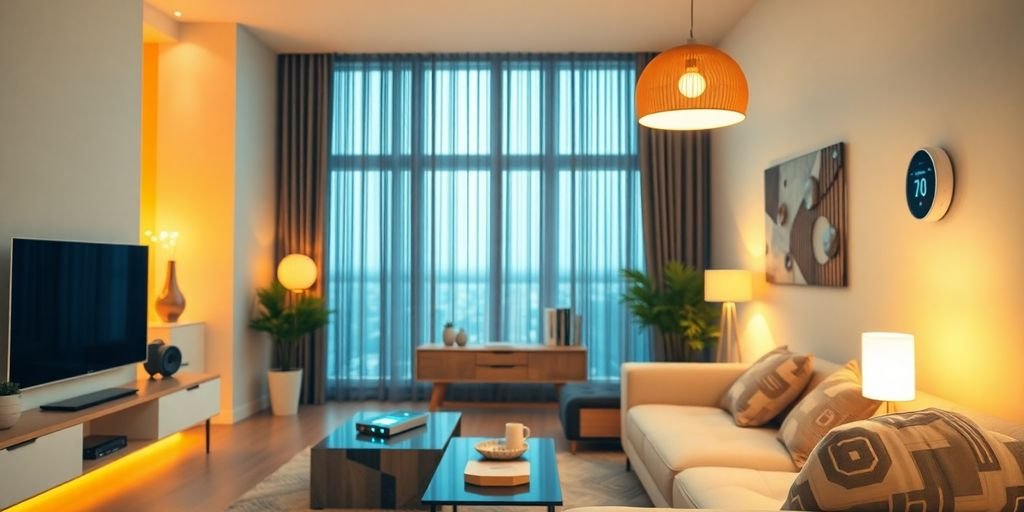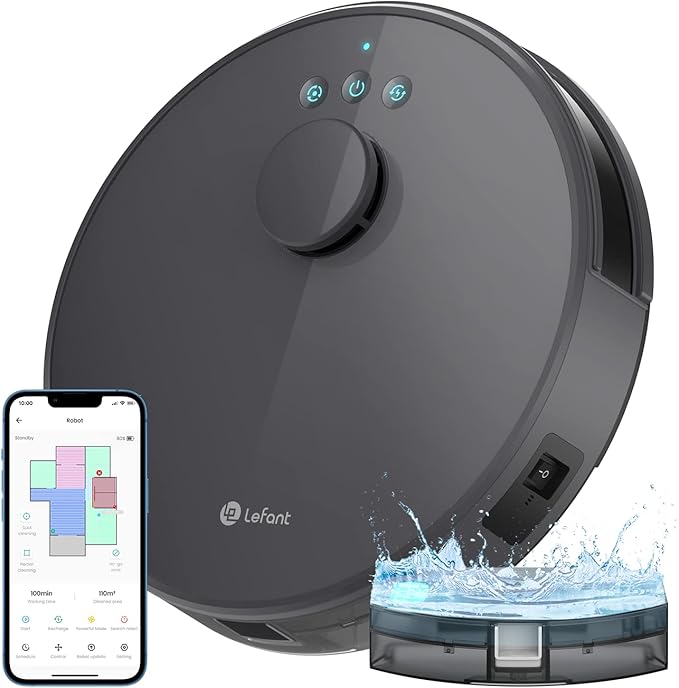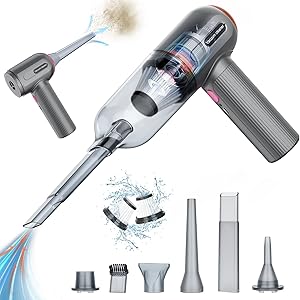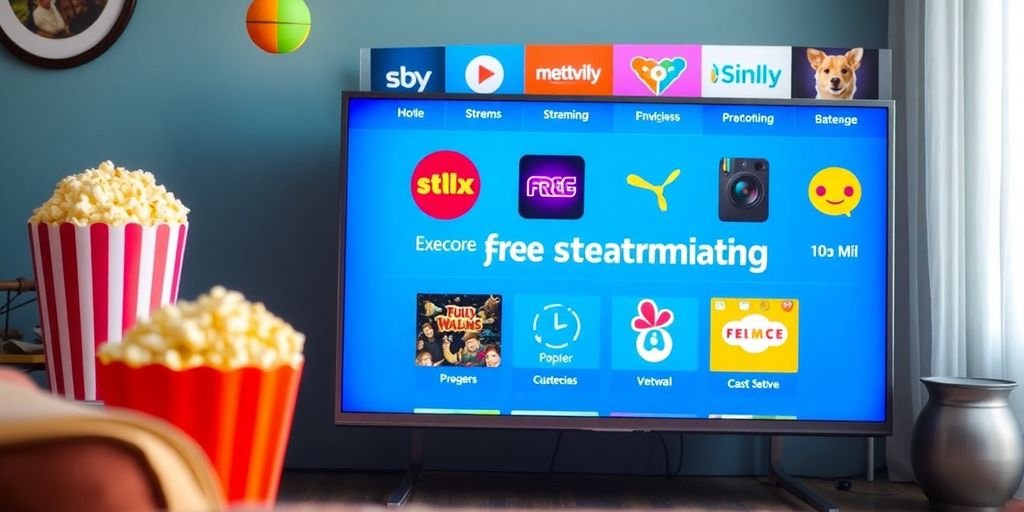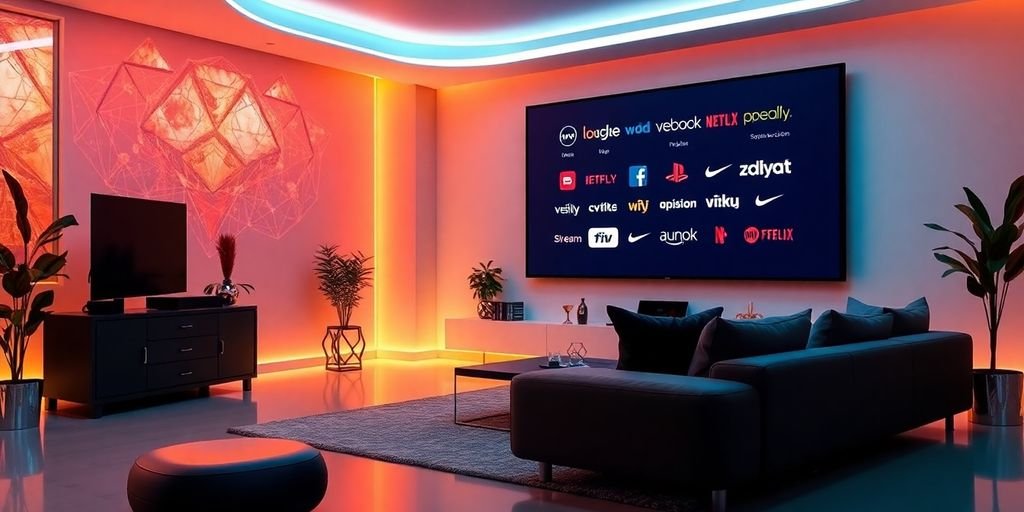As we step into 2025, our homes are becoming smarter than ever, thanks to the rapid rise of smart devices. These gadgets are not just fancy tech toys; they are changing how we live, work, and interact with our environments. From enhancing security to improving energy efficiency and promoting health, smart devices are making our everyday lives easier and more convenient. In this article, we’ll explore the various ways these devices are revolutionising our homes and what the future holds for smart living.
Key Takeaways
- Smart devices are transforming daily routines, making life more convenient.
- Home security has improved significantly with smart cameras and locks.
- Energy efficiency is enhanced through smart appliances and lighting.
- Health and wellness are supported by monitoring devices and air quality systems.
- Future trends include better AI integration and a focus on privacy and security.
The Rise of Smart Devices in Modern Homes

Smart devices are no longer a luxury; they’re rapidly becoming a standard feature in homes across the UK. The integration of these technologies is transforming how we interact with our living spaces, making them more efficient, secure, and comfortable. The internet of things is really changing things.
Transforming Daily Routines
Smart devices are streamlining everyday tasks, freeing up valuable time and reducing stress. Imagine waking up to a home that anticipates your needs: lights gradually brightening, the heating adjusting to the perfect temperature, and your coffee brewing automatically.
- Automated lighting schedules
- Smart thermostats adjusting to occupancy
- Voice-controlled assistants managing to-do lists
These innovations are making our lives easier and more convenient. It’s all about IoT in smart homes these days.
Enhancing Home Security
Home security has been revolutionised by smart devices, offering homeowners unprecedented control and peace of mind. Smart doorbells with video surveillance, motion sensors, and remote locking systems provide a comprehensive security solution.
- Real-time monitoring via smartphone apps
- Facial recognition technology
- Integration with local law enforcement
These features deter potential intruders and provide valuable evidence in the event of a break-in.
Smart security systems are not just about preventing crime; they’re about creating a safer and more secure environment for families.
Improving Energy Efficiency
Smart devices are playing a crucial role in reducing energy consumption and promoting sustainability. Smart thermostats learn your heating and cooling preferences, adjusting automatically to optimise energy usage. Smart lighting systems can be programmed to turn off when rooms are unoccupied, and smart appliances can be scheduled to run during off-peak hours.
| Device | Energy Savings (Approx.) |
|---|---|
| Smart Thermostat | 10-12% |
| Smart Lighting | 15-20% |
| Smart Appliances | 5-10% |
These measures not only reduce utility bills but also contribute to a greener future. It’s a win-win situation for homeowners and the environment.
Innovative Smart Appliances
Revolutionising Kitchen Tasks
Smart appliances are really changing how we do things in the kitchen. Forget about just having a fridge that keeps things cold; now, we’ve got smart fridges that can actually track what food you have inside, suggest recipes based on what’s available, and even automatically create shopping lists. It’s like having a personal assistant dedicated to your groceries! Ovens can now be controlled remotely, so you can preheat them on your way home from work. Dishwashers can optimise their cycles based on how dirty the dishes are, saving water and energy. It’s all about making life easier and more efficient.
Streamlining Laundry Processes
Tired of laundry piling up? Smart washing machines and dryers are here to help. These appliances can be controlled remotely via your smartphone, allowing you to start, stop, or pause cycles from anywhere. Many models also come with built-in sensors that can detect the type of fabric and adjust the settings accordingly, preventing damage to your clothes. Plus, some machines can even send you alerts when the laundry is done, so you never forget to switch loads again. It’s a game-changer for busy households.
Optimising Energy Consumption
One of the biggest benefits of smart appliances is their ability to help you save energy. Smart refrigerators, for example, can monitor their internal temperature and adjust their cooling cycles to minimise energy waste. Washing machines and dryers can optimise their water and energy usage based on the load size and fabric type. Many smart appliances also come with energy-saving modes that can further reduce your carbon footprint. It’s a win-win for your wallet and the environment.
By using smart appliances, you’re not only making your life easier but also contributing to a more sustainable future. These devices help reduce energy consumption, minimise waste, and optimise resource usage, making your home more environmentally friendly.
Smart Lighting Solutions
Smart lighting has really come into its own, hasn’t it? It’s not just about turning lights on and off anymore; it’s about creating the perfect atmosphere and saving a bit of money while you’re at it. I remember when I first got a smart bulb – it felt like something out of a sci-fi film. Now, it’s just another part of the house.
Customisable Ambiance
One of the coolest things about smart lighting is how customisable it is. You can change the colour, the brightness, and even set different scenes for different moods. Imagine having a warm, soft light for relaxing in the evening and a bright, energising light for when you’re working from home. It’s all controlled from your phone, which is pretty neat. I’ve got mine set up so that the lights dim automatically as the sun goes down. It’s a small thing, but it makes a big difference.
Energy-Saving Features
Energy efficiency is a big deal these days, and smart lighting can really help. You can set timers so that lights turn off automatically when you’re not in the room, and some systems even learn your habits and adjust accordingly. Plus, LED bulbs use way less energy than traditional ones, so you’re saving money on your electricity bill too. It’s a win-win.
Here’s a quick look at the potential savings:
| Bulb Type | Wattage | Lifespan | Energy Cost (per year) |
|---|---|---|---|
| Incandescent | 60W | 1,000 hours | £15 |
| LED | 8W | 25,000 hours | £2 |
Integration with Voice Assistants
Being able to control your lights with your voice is incredibly convenient. "Alexa, turn on the living room lights!" It feels like living in the future. You can also create routines so that multiple lights turn on or off at the same time, or even integrate them with other smart home devices. For example, you could have your lights dim automatically when you start watching a film. It’s all about making life a little bit easier. If you’re looking for top smart lighting options, there are many to choose from.
I’ve found that setting up voice control for my lights has been a game-changer. No more fumbling for switches in the dark – just a simple voice command and the lights are on. It’s especially useful when my hands are full or when I’m feeling too lazy to get up. Plus, it impresses guests every time.
Health and Wellness Through Smart Devices
Smart devices are moving beyond just convenience; they’re becoming essential tools for managing our health and well-being. It’s pretty amazing how much data we can now collect about ourselves without even leaving the house. From monitoring our sleep to tracking our activity levels, these gadgets are giving us a much clearer picture of our overall health.
Monitoring Health Metrics
Smart scales are no longer just about weight; they measure body fat, muscle mass, and even hydration levels. Fitness trackers, of course, are old news, but they’re getting smarter, too. They can now track sleep stages, heart rate variability, and even stress levels. All this data syncs with apps on our phones, giving us a comprehensive overview of our health trends over time. It’s like having a personal health dashboard right at your fingertips. This allows for better remote health monitoring.
Improving Indoor Air Quality
Indoor air quality is something most of us don’t think about, but it can have a huge impact on our health. Smart air purifiers can monitor the levels of pollutants, allergens, and other harmful particles in the air. They automatically adjust their settings to maintain a healthy environment. Some even send alerts when air quality drops, prompting you to take action.
- Monitor particulate matter (PM2.5 and PM10)
- Detect volatile organic compounds (VOCs)
- Adjust fan speed automatically
Supporting Active Lifestyles
Smart devices can also play a role in encouraging us to be more active. Smartwatches can track our steps, distance, and calories burned, while also providing motivation through challenges and rewards. Some devices even offer guided workouts and personalised training plans. It’s all about making fitness more accessible and engaging. The integration with voice assistants makes it easier to start a workout or check your progress without even lifting a finger.
It’s important to remember that smart devices are just tools. They can provide valuable data and insights, but they’re not a substitute for professional medical advice. Always consult with a doctor or other qualified healthcare provider before making any major changes to your health or treatment plan.
The Role of Smart Home Hubs

Centralised Control of Devices
Smart home hubs are becoming increasingly common. They act as the brain of your smart home, connecting all your different devices. This means you can control everything from one place, rather than juggling multiple apps. It’s way easier to manage your lights, security system, and entertainment setup when they’re all linked through a single hub. I remember when I had to use like five different apps just to turn off all the lights before bed. What a pain!
Creating Custom Routines
One of the best things about smart home hubs is the ability to create custom routines. For example, you can set up a "Good Morning" routine that gradually turns on the lights, starts playing your favourite radio station, and brews a cup of coffee. Or a "Leaving Home" routine that locks the doors, turns off the lights, and adjusts the thermostat. It’s all about automating those repetitive tasks and making life a little bit easier. Here are some routine examples:
- Morning Routine: Lights on, coffee brewing, news playing.
- Evening Routine: Doors locked, lights dimmed, security system armed.
- Weekend Routine: Music playing, temperature adjusted, notifications silenced.
Enhancing Interoperability
Making sure all your smart devices work together can be a real headache. Different brands often use different communication protocols, which can lead to compatibility issues. Smart home hubs help to bridge these gaps by supporting multiple protocols and providing a central platform for devices to communicate.
It’s not perfect, but it’s getting better. The goal is to have a truly unified smart home experience where everything just works, regardless of the brand or protocol. We’re not quite there yet, but hubs are definitely a step in the right direction.
Future Trends in Smart Home Technology
Advancements in AI Integration
AI is getting better all the time, and that means our smart homes will get even smarter. Imagine a home that learns your habits and anticipates your needs before you even realise them yourself. We’re talking about AI that can adjust the lighting based on the time of day and your mood, or order groceries when it notices you’re running low. It’s not just about convenience; it’s about creating a living space that truly understands and responds to you. The potential is huge.
Focus on Privacy and Security
With all these smart devices collecting data, privacy and security are a big deal. People are starting to worry about who has access to their information and how it’s being used. So, companies are working hard to make sure everything is secure. We’re seeing better encryption, more secure authentication methods, and a greater focus on giving users control over their data. It’s all about building trust and making sure people feel safe and secure in their own homes.
Emerging Interoperability Standards
One of the biggest problems with smart home devices right now is that they don’t always work well together. You might have a smart thermostat from one company and smart lights from another, and getting them to communicate can be a real pain. That’s where interoperability standards come in. These standards are designed to make it easier for different devices to work together, regardless of who makes them. The Matter protocol is a good example of this. It’s still early days, but it could make a big difference in how we set up and use our smart homes in the future.
The push for interoperability is not just about convenience; it’s about creating a more open and accessible smart home ecosystem. This means more choice for consumers and less reliance on single vendors. It’s a win-win for everyone involved.
Entertainment and Smart Devices
Smart devices have completely changed how we experience entertainment at home. It’s not just about watching TV anymore; it’s about creating an immersive, interactive environment. I remember when I had to get up to change the channel! Now, everything is voice-controlled and connected. It’s pretty wild.
Integrated Audio-Visual Systems
Imagine this: your lights dim automatically as the film starts, and the sound adjusts to create the perfect atmosphere. That’s the reality with integrated audio-visual systems. These systems link your TV, speakers, and lighting to provide a coordinated entertainment experience. Setting up a smart home hub can really help with this. It’s like having your own personal cinema, but without the sticky floors and overpriced popcorn.
Voice-Controlled Entertainment
"Alexa, play my chill playlist." It’s something I say multiple times a day. Voice control has made entertainment so much easier. No more searching for the remote or fiddling with complicated menus. You can control everything with your voice, from changing the volume to switching between streaming services. It’s especially useful when you’re cooking or just too comfy to move. I’ve even set up routines so that when I say "movie night", the TV turns on, the lights dim, and the popcorn machine starts heating up. It’s peak laziness, but I love it.
Streaming and Connectivity
Streaming services are the backbone of modern entertainment. Smart devices make it easy to access a huge library of films, TV shows, and music. The key is connectivity. Here’s a few things to consider:
- Make sure your Wi-Fi is up to scratch.
- Consider a mesh network for better coverage.
- Check that your devices support the latest streaming standards.
I upgraded my router last year, and it made a world of difference. No more buffering during crucial scenes! It’s a small investment that pays off big time in terms of entertainment enjoyment. Plus, with everything connected, it’s easy to share content between devices. I can start watching a film on my tablet and then pick it up on the TV without missing a beat. It’s all about convenience, really.
Looking Ahead: The Smart Home Landscape
As we look to the future, it’s clear that smart devices are changing the way we live in our homes. By 2025, these gadgets will not just be about convenience; they’ll be integral to our daily lives. From managing energy use to enhancing security, the benefits are hard to ignore. Sure, there are challenges, like privacy concerns and the need for better compatibility between devices, but the potential is exciting. With advancements in technology, our homes will become even smarter, adapting to our needs and making life easier. It’s an interesting time to be a homeowner, and I can’t wait to see what comes next.
Frequently Asked Questions
What are smart devices?
Smart devices are gadgets that connect to the internet and can communicate with each other. They help make our homes more convenient and efficient.
How do smart devices improve home security?
Smart devices like cameras and doorbells can alert you to movement and let you see who is at your door from your smartphone.
Can smart devices save energy?
Yes, many smart devices, like thermostats and lights, can help reduce energy use by adjusting settings automatically based on your habits.
What is a smart home hub?
A smart home hub is a central device that connects all your smart gadgets, allowing you to control them from one place.
How do smart devices support health and wellness?
Smart devices can monitor things like air quality and track health metrics, helping you maintain a healthier lifestyle.
What future trends are expected in smart homes?
Future trends include better integration of devices, stronger focus on privacy, and advancements in artificial intelligence to make homes even smarter.

